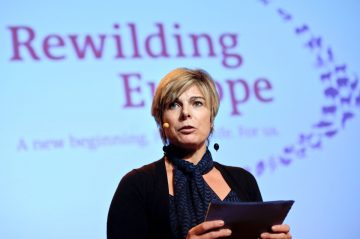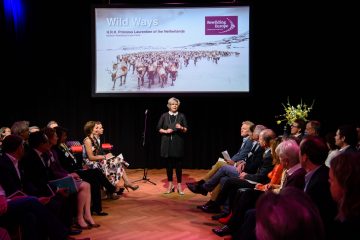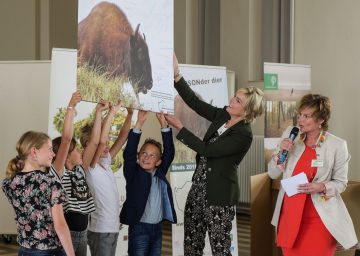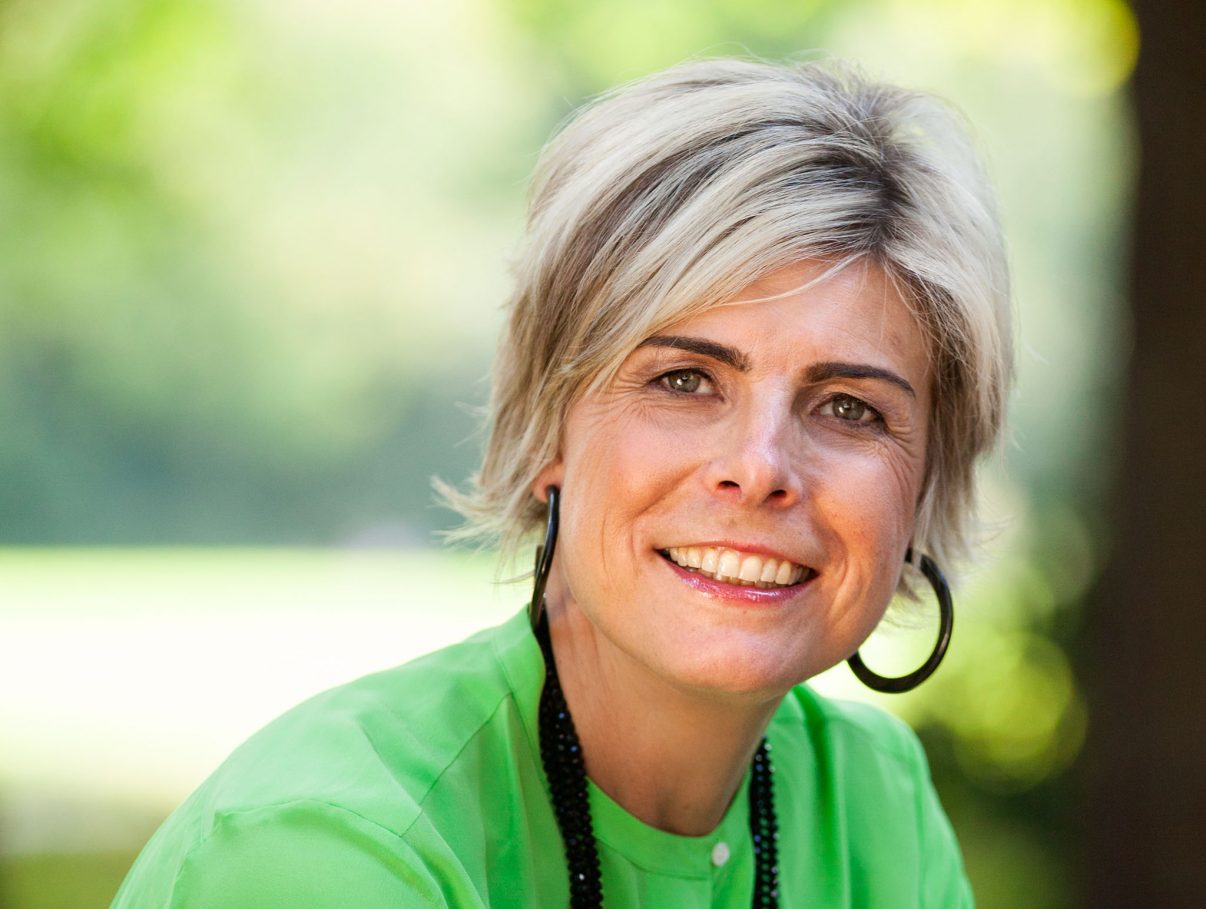Over the coming months, Rewilding Europe will conduct interviews with prominent persons in conservation and rewilding across Europe. We are delighted and honoured that Princess Laurentien of the Netherlands has agreed to feature as the first interviewee of this series, as we launch our new website. She has been actively involved from the beginning as a special advisor to Rewilding Europe.
Can you briefly tell us about the history of your involvement with Rewilding Europe? When did you first hear about it, and why did you choose to become involved?
I had the honour of moderating the official launch of Rewilding Europe in Brussels in 2010. I immediately loved the European dimension, the ambition and energy of the team behind it. It was hard to resist getting more involved and it has been a special pleasure to watch the initiative grow ever since. I have always been passionate about wild nature, and have been active in the fields of sustainability, conservation and climate change for many years. It was therefore a natural decison for me to work with Rewilding Europe because we share the same vision for Europe.
Having worked with African Parks and the European Climate Foundation, and as the current president of Flora and Fauna International, you have an extensive background in conservation. What are your views on rewilding as a conservation approach? Are there any aspects of rewilding that you find particularly refreshing or innovative?
Rewilding is a progressive approach to conservation that can help us overcome the many challenges that we currently face in modern Europe. This requires not only a strong and inspiring vision and philosophy, but also practical cooperation with local partners and a long-term dedication to get things right for everyone involved.
By promoting, conserving and enhancing Europe’s shared natural heritage, and by leveraging this heritage to develop nature-based economies, rewilding serves the interest of every European, both from an economic and a health and wellbeing viewpoint. I think humans often forget that we are part of nature, not apart from it. With its holistic perspective, rewilding emphasises this.

What would you say are the biggest conservation challenges that Europe faces today? How can rewilding help address those challenges? Why does Europe (and Europeans) need rewilding?
Today wildlife and wild nature are in decline across much of Europe, as habitats are impacted by urban sprawl, unsustainable agricultural, forestry and fishing practices, infrastructure that limits connectivity, and commercial industries such as mining. This is deeply worrying and we cannot allow these trends to continue. Life in a sterile, micro-managed Europe devoid of wild nature is unthinkable.
Rewilding can address these challenges because it provides a viable and sustainable alternative to the status quo. Initiatives such as Rewilding Europe are showing that people can earn a fair living from the wild, and that wild nature and sound economic practice don’t have to be mutually exclusive.
The story of Europe’s wildlife is not all doom and gloom. Today some species – such as the brown bear, Eurasian lynx, wolf, eagles and cranes – are making a comeback. I think this shows the great resilience of wild nature and natural processes. We shouldn’t be afraid of those processes, but work with them. Rewilding and Rewilding Europe are showing us how we can do this.
The European Union only allocates a tiny portion of its annual budget (0.3%) to conservation and climate change issues. Would you like to see the amount increased, and why?
The reality is that at the current level, EU funding simply cannot deliver effective nature conservation. And yet nature is our life. All of us depend on nature for clean air, fresh water, good soil and pollination. Safeguarding and enhancing biodiversity is critical, not only for the species that Europeans live alongside, but for Europeans themselves.
So yes, it would only be logical to increase the amount allocated. These resources should be seen as an investment into future generations, not a cost to us now. And with conservation programmes such as LIFE generating a high rate of economic return and creating jobs through green investment, increased funding makes economic sense too. We need to develop Green and Blue Infrastructure for Europe, using rewilding principles, making Europe’s natural areas more robust and well-functioning.

This new website is being launched seven years after Rewilding Europe was founded. What would you say are Rewilding Europe’s major achievements since foundation, and what are your expectations for the next seven years?
I have been tremendously impressed with and proud of the progress Rewilding Europe has made since the start. I think, above all, the initiative has shown that rewilding can work on a practical level. It has been a learning process, and there have been setbacks. But when you take a close look at the areas across our continent where Rewilding Europe currently operates, from Lapland to the Danube Delta, you can see how rewilding is really starting to make a difference, not only in terms of wild nature, but also in terms of people’s lives and livelihoods.
Through its efforts, Rewilding Europe has also significantly raised the profile of rewilding as a new conservation approach. On the enterprise side, Rewilding Europe Capital is now investing in an ever-growing number of green businesses, supported by the European Investment Bank. The burgeoning European Rewilding Network is connecting like-minded rewilding initiatives and facilitating the sharing of knowledge and expertise across the continent. And the European Wildlife Bank is ensuring that natural grazing retakes its place in European habitats, boosting biodiversity and restoring food chains. Rewilding as a holistic approach to conservation is now really taking hold and is the subject of increasing worldwide attention.
Over the next seven years I would hope that rewilding efforts continue to bear fruit, with large rewilding landscapes as prominent showcases. I would like to see much more land set aside for rewilding, with iconic European wildlife species such as the European bison and European lynx continuing to make a comeback. Hopefully, as a result, more Europeans will connect and reconnect with wild nature, and discover the great joy it can bring. And we need more green businesses, providing more Europeans with jobs and livelihoods and demonstrating that we can do things different. And finally, I certainly wish to see the great value and importance of rewilding increasingly recognised in terms of European policy and legislation, and also in terms of increased funding.
One of Rewilding Europe’s aims is to reconnect people with wild nature. Do you need wild nature in your life, and if so, what does it give you? Where are you favourite places for reconnecting with nature?
The short answer is yes. Wild nature energises me mentally, physically and spiritually. How dull and joyless our lives would be if we were just surrounded with concrete and glass, without trees or clean rivers or birdsong.
Some of my favourite places farther away are Spitsbergen, Patagonia and the Grand Canyon. But closer to home, I love spending time in the older forests in Germany, and the wilder parts of the dunes in my own country, the Netherlands.
These days a lot of the news about the environment, biodiversity and conservation issues is negative. Are you optimistic about the future of wild nature in Europe and across the world?
Wild nature is not a luxury, it’s a necessity. They say that nature finds a way, and it generally does. Yes, we are admittedly facing some huge conservation challenges in Europe and across the world. But more and more Europeans and global citizens are now standing up and giving the green agenda their passionate support. Nature is resilient – we just need to take a step back, change our values, and let it flourish once again. Nature is the best ally we have. And Rewilding Europe makes me hopeful.

You also have a strong background in communication. How important would you say communication is in conservation? Do you think Rewilding Europe is doing a good job in reaching out to people across Europe and highlighting the importance of conserving and restoring the continent’s wild nature?
Good communication is critically important to conservation. If done well, communication creates dialogue, brings people together and in doing so it generates synergy and mitigates problems. Powerful imagery can truly touch people’s hearts and generate strong emotions about nature. It has the power to reach out to and influence everyone from potential donors and nature tourism professionals to amateur wildlife photographers and local schoolchildren learning about nature for the very first time. But communication is not only about the digital realm and mass media work – real life and face-to-face discussions, gatherings and meetings remain critical, especially in the areas where Rewilding Europe works.
I think Rewilding Europe is doing a great job in promoting rewilding as a new conservation approach, using a wide range of tools. This great new website, packed with information and rewilding-related news items from across Europe, is a great way of not only informing people, but also inviting them to participate in the rewilding movement.
In conservation good communications frequently start at grassroots level, and I have heard stories about local rewilding teams taking time to reaching out to people effectively and building trust. Without winning and maintaining people’s trust then rewilding will never work, and communication is the key to this. I know that Rewilding Europe appreciates this.
And finally, to all those involved with Rewilding Europe, both directly and as passionate supporters of the cause, do you have anything that you’d like to add to the answers above?
On the occasion of this new website launch, I’d like to congratulate all those involved, directly and indirectly, with Rewilding Europe and its diverse efforts. That includes everyone from partners, donors and enthusiastic supporters right through to the teams and entrepreneurs on the ground making rewilding a reality. The first seven years of Rewilding Europe have witnessed inspirational growth in the rewilding movement. Let’s keep going, and please make sure you find time to enjoy Europe’s wild nature as much as I do!

